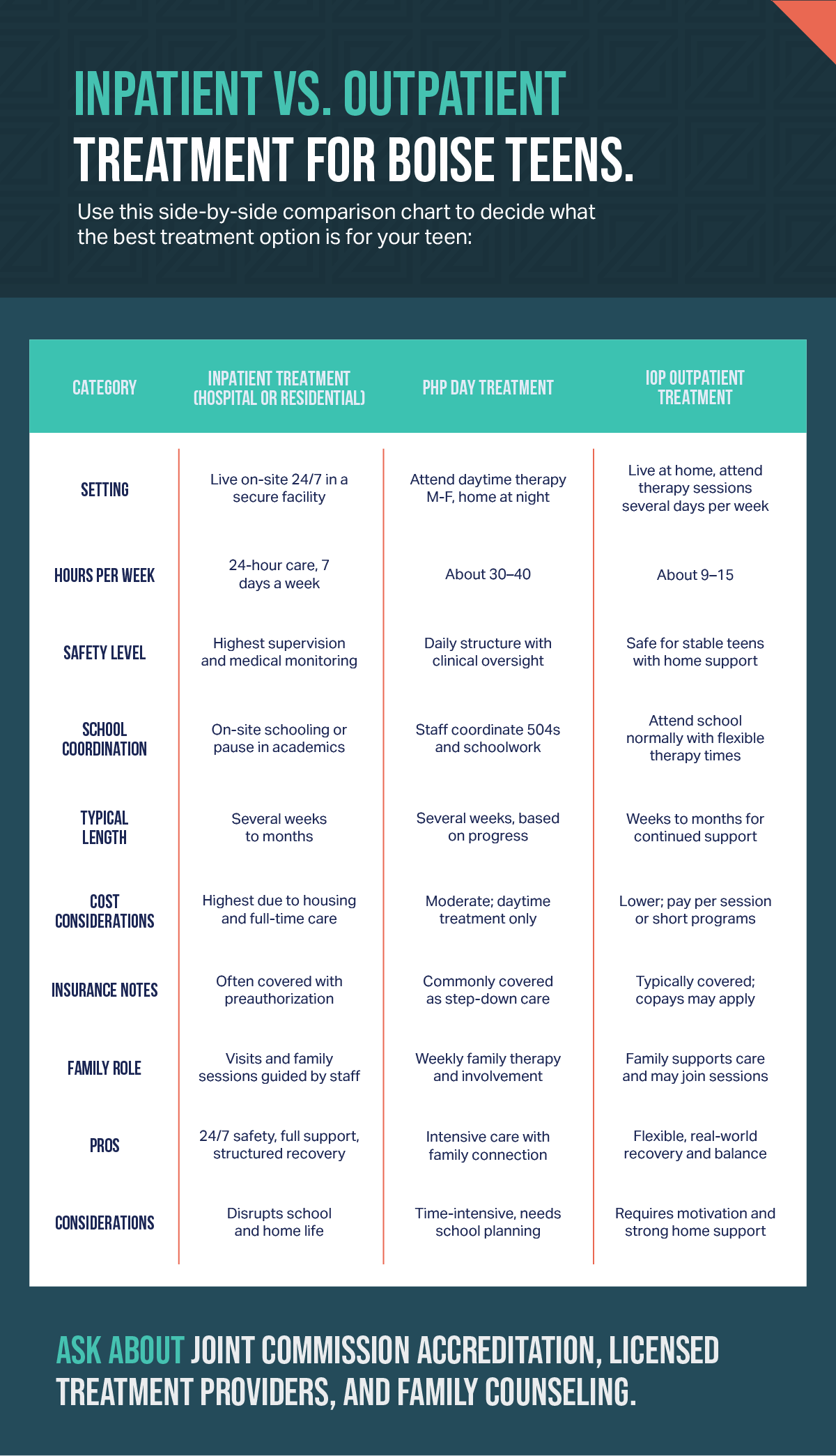Parents often face a tough choice when a teen starts struggling with substance use and co-occurring mental health concerns. Do you choose inpatient care, or is outpatient treatment enough support while your teen stays at home and keeps up with school?
Zelus Recovery supports families in Boise, ID, through assessments, treatment planning, and holistic outpatient addiction services for adolescents and adults in Meridian, ID, just outside Boise. This guide explains inpatient vs. outpatient addiction treatment in plain language and outlines how to decide what level of care fits your teen’s needs.
What is inpatient treatment for teens?
Inpatient treatment means your teen lives at the treatment facility 24 hours a day for a period of time. This can include hospital‑based stabilization, short hospital stays for safety, or residential treatment centers that provide a controlled environment with round‑the‑clock supervision.
Day to day, inpatient programs focus on safety first, then therapy and skills. A typical schedule includes medical evaluation, medication management when appropriate, individual counseling, group therapy, and family counseling. Schoolwork is often supported on campus or coordinated with your school district. Because teens receive care in an inpatient setting, treatment providers can respond quickly to crises, monitor mental health symptoms, and manage drug cravings in a structured way.
Inpatient care can be brief for stabilization, or it can be longer for intensive treatment, depending on clinical needs. For teens with a severe substance use disorder, uncontrolled alcohol dependence, recent overdose, active self‑harm risk, or a mental health condition such as bipolar disorder that is not stable, inpatient treatment programs often provide the safest first step.
What is outpatient (PHP/IOP) treatment for teens?
Outpatient treatment allows teens to live at home and attend school while receiving structured care in the community. At Zelus Recovery, we offer two outpatient programs for teens:
- Partial hospitalization, often called PHP or day treatment: Teens attend treatment most weekdays for 5 to 6 hours per day, then return home each evening. PHP programs offer a high level of structure without an overnight stay, which can be helpful after an inpatient stay or when safety can be maintained at home.
- Intensive outpatient, or IOP: Teens typically attend treatment 3 to 5 days per week for 3 hours per day. IOP focuses on therapy, peer support, coping skills, and relapse prevention while teens continue school and activities.
Outpatient treatment includes a mix of scheduled programs including individual therapy, group counseling, family counseling, psychiatric check‑ins for medication management when needed, and case management that coordinates with schools. Because teens remain in their real‑life environment, outpatient care helps them practice coping skills in real time in the situations where triggers happen.

When teens need inpatient care
Choose inpatient care when safety or medical needs are urgent, or when outpatient care has not been enough. Warning signs include:
- Recent overdose, alcohol poisoning, or life‑threatening withdrawal risk
- Active suicidal thoughts, self‑harm behavior, or severe aggression that cannot be safely managed at home
- Severe co‑occurring mental health disorders such as mania or psychosis, that require close monitoring
- Repeated attempts at outpatient rehab with limited progress, including continued substance use that disrupts school and home life
- Unstable home environment, lack of sober supervision, or unsafe access to substances
Research shows that both inpatient and outpatient treatment can be effective when matched properly to a teen’s needs. Family involvement and evidence‑based therapies are key in any setting, and medications may be used when indicated for certain substance use disorders or mental health conditions.
When outpatient care is the right fit
Outpatient care is often appropriate when a teen is medically stable, not at high risk for self‑harm, and has consistent supervision at home. Good candidates can:
- Keep up with school, at least with support, and attend treatment on time
- Have a parent or guardian who can monitor safety, medications, and screen time
- Use skills learned in therapy at home and in the community, with coaching from treatment providers
- Benefit from structured practice in real‑life settings: for example, around peers or after‑school activities
Outpatient drug rehab gives adolescents practical tools while maintaining normal routines. PHP programs offer more hours for teens who need day treatment structure, while IOP provides meaningful support with fewer hours so teens can sustain school engagement.
Outpatient mental health care often follows inpatient stays, supporting long-term recovery and reducing relapse risk.
Not sure which is right for your teen?
Zelus can help you decide.
Is outpatient less effective than inpatient?
Effectiveness depends on matching the level of care to clinical need, not on choosing inpatient or outpatient by itself. Research highlights that the best treatment program is one that is evidence‑based, addresses substance use and mental health together, and involves families in ongoing care. Outpatient drug rehab can be highly effective for teens who are safe at home, especially when PHP or IOP intensity is used early, then stepped down as symptoms improve. Inpatient care is critical for safety, detox monitoring, and stabilization when risks are high.
For example, a teen with moderate cannabis and alcohol use who is failing classes and has anxiety might benefit from IOP, with family therapy, skills practice, and school coordination. A teen with severe opioid use and suicidal thoughts would likely need inpatient care first, followed by PHP programs, then IOP, and finally standard outpatient therapy for continued support.
Day‑to‑day life in outpatient care
Parents often ask what outpatient looks like in Boise, ID. A typical IOP week might include:
- 3 afternoons of group therapy focusing on coping skills, relapse prevention, and peer support.
- 1 individual session addressing triggers, stress, and school issues.
- 1 family session building communication and boundaries, plus home practice assignments.
- Medication management check‑ins if your teen is receiving treatment for a mental health disorder or needs support for cravings.
- Coordination with school counselors to support attendance, homework, and reentry to classes.
PHP day treatment is similar, but longer hours each weekday create a more structured schedule that bridges the divide between inpatient and outpatient care.
What type of care is best for teens with substance use concerns?
The best care fits clinical needs, keeps your teen safe, and supports your family. Look for programs that:
- Offer integrated mental health treatment for co‑occurring conditions.
- Use evidence‑based therapies such as cognitive behavioral therapy and dialectical behavior therapy
- Include strong family support, parent workshops, and group counseling.
- Employ licensed treatment providers who specialize in adolescents.
- Coordinate with schools, pediatricians, and community supports in Boise.
- Provide clear treatment plans and measure progress.
How costs and insurance shape your decision
Many families balance clinical needs with practical realities. Here is a quick guide:
- Inpatient care usually has higher costs because of 24‑hour staffing and a controlled environment. Out-of-pocket costs vary with deductibles, coinsurance, and network rules.
- PHP and IOP often cost less overall and may be covered when medical necessity is documented.
- Insurance providers sometimes require a step‑down sequence: for example, inpatient to PHP to IOP, before standard outpatient therapy.
Ask the inpatient or outpatient program to verify your insurance and walk you through your benefits and possible costs before receiving treatment.
Next steps for families in Boise, ID
Choosing between inpatient and outpatient care is not about picking a “better” option; it is about choosing the right level of support at the right time. For many teens struggling with substance use and co‑occurring mental health challenges, the path includes several levels of care over time, from inpatient to PHP to IOP to standard outpatient therapy. With the right match, treatment can be life-changing, and families gain skills that support long-term recovery.
Not sure where to start in Boise, ID? Our team can review your situation, explain treatment options, and help you decide whether inpatient care or an outpatient treatment program is the safest next step.





